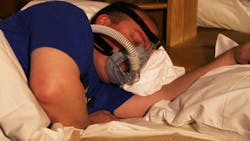Portable CPAP machines could be the difference in a safe trip
Getting a good night’s sleep on the road can be the difference between a good shift and a terrible shift for professional long-haul drivers. From finding safe parking with decent amenities to getting comfortable in the sleeper berth, there are more obstacles to good rest than a typical American faces. With nearly a third of truck drivers suffering from sleep apnea, productive rest can be even more elusive.
“Sleep apnea is one of those disorders you never really notice in yourself,” according to Dr. Mark Aloia, a sleep expert at National Jewish Health in Denver. “I mean, you’re asleep, you’re consciously not aware of what’s happening to you."
Untreated sleep apnea is linked to severe medical conditions including depression, heart disease, hypertension, Type II diabetes, obesity and cancer. One of the most significant risks in the trucking world is for drivers suffering from the disorder, leading to unproductive sleep cycles and being more at risk of falling asleep at the wheel. Aloia said it’s important to convince these at-risk people “of the urgency of their condition.”
Sleep apnea is a breathing-related sleep disorder that causes short interruptions of breathing during sleep. People suffering from sleep apnea can stop breathing for 10 seconds or more up to 400 times while asleep, according to a University of Pennsylvania study sponsored by the Federal Motor Carrier Safety Administration. The study found that 28% of commercial truck drivers suffer from sleep apnea.
Aloia suggested lifestyle changes that lead to weight loss are the best ways to combat sleep apnea. Breathing assistance devices such as continuous positive airway pressure (CPAP) machines help a person breathe more easily during sleep. The CPAP machine, which includes a face or nasal mask connected to a pump, increases air pressure in the throat, so the airway doesn’t collapse when a person breathes in.
Most people who use CPAP find immediate relief to sleep apnea, according to the National Sleep Foundation. The foundation said it could take two to 12 weeks for sleep apnea sufferers to get used to wearing a CPAP device. Once they do, more than half of those who use one regularly continue because of the benefits, including more energy and increased mental sharpness after a good night’s sleep.
Aloia led a pilot study last decade that involved those who discontinued using CPAP machines, which some patients describe as uncomfortable or bulky. In the study, the doctor had sleep apnea patients who didn’t regularly wear a CPAP mask watch videos of themselves sleeping. One patient saw himself writhe and periodically gasp for air during the night.
“It was a powerful moment in my life,” said John Brugger, who was part of the study. “It made me cry watching it, and to see myself basically drowning in my sleep, made me very determined to fix that.”
Aloia said that patients in the study had a significant increase in CPAP usage after watching videos of themselves struggling to breathe. “We really created a personal sense of urgency in these patients in order to change their behavior,” the doctor added.
For years, CPAP machines were seen as large, bulky contraptions that were tough to travel with and use while on the road. But recently, the technology has become more compact. Here is a look at four CPAP machines designed for travel that could benefit truck drivers on the road.
Philips Respironics DreamStation Go
Philips’ DreamStation Go CPAP is one of the newest travel breathing machines on the market. This lightweight CPAP machine (1.86 lbs.) is designed for travelers. It features a USB charging port, micro tubing and easy, on-the-go setup. Along with the USB port, the machine includes an additional overnight battery that runs for up to 10 hours on a single charge. It also features touchscreen controls and can track sleep statistics.
ResMed AirMini
One of the smallest CPAP machines on the market, the AirMini from ResMed weighs just 10.56 oz. It can connect to smartphones and tablets via Bluetooth, allowing users to choose from therapy mode, three pressure modes, expository pressure relief (EPR), and track sleeping stats. It also adds moisture while patients sleep, reducing the need for a separate humidifier.
Human Design Medical Z2 Auto Travel CPAP
Weighing even less is the Human Design Medical Z2 Auto Travel CPAP machine (10.4 oz), which also has a built-in humidifier. One of the more affordable travel CPAP machines, its battery life can be extended up to nine hours with an additional PowerShell battery. While it has fewer features than other travel CPAP machines, it also costs less.
Somnetics Transcend 3 Auto miniCPAP
The rugged Somnetics Transcend 3 Auto miniCPAP machine weighs 14.4 oz. and is about the size of a soda can. It comes with software PC-compatible software (but is not compatible with Mac OS or mobile devices). But it does have solar-power capabilities, along with the standard DC mobile power adaptor. An extended battery that offers up to 16 hours of continuous use is also available.
About the Author
Josh Fisher
Editor-in-Chief
Editor-in-Chief Josh Fisher has been with FleetOwner since 2017. He covers everything from modern fleet management to operational efficiency, artificial intelligence, autonomous trucking, alternative fuels and powertrains, regulations, and emerging transportation technology. Based in Maryland, he writes the Lane Shift Ahead column about the changing North American transportation landscape.

